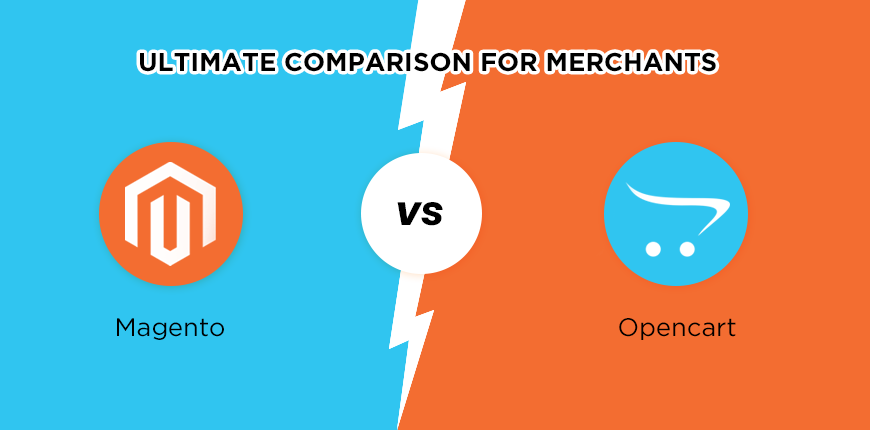When starting your online store, there are multiple options as to which eCommerce platform you should use.
Among Magento, Shopify, OpenCart, and multiple other B2B eCommerce platforms, each has its benefits and drawbacks. As a merchant, it í crucial to be well-informed before making a decision.
In this post, we will address two eCommerce platforms, Magento vs OpenCart, and compare the two platforms in both similarities and differences to help you make a smart and well-informed decision about which one is the most suitable solution for your business.

If you are also interested in checking out other Magento alternative platforms to start your business with, then check our comparison with the Shopify article linked in the later sections of this post.
Magento vs OpenCart: Overview
Table of Contents
Magento and OpenCart are two of the biggest eCommerce platforms in the market. They are both robust with features, resourceful, and on equal footing in terms of popularity.
This is the common reason why merchants find it difficult when putting Magento 2 vs OpenCart into consideration in their search journey and decide which is the best platform they should choose for their store.
Magento
Overall, Magento is owned by Adobe and is the gold among the open-source eCommerce platforms. It has merchants in complete control of their store’s aspects and high scalability with all advanced features. Furthermore, this eCommerce platform is the perfect choice for your custom business if you have the technical knowledge and a development team to design and customize your online store.
This platform comes with two versions, among other supporting products, which are Open Source and Commerce. Magento also announced Commerce Cloud’s release, the end-to-end cloud-based platform for merchants to manage, personalize, and optimize the eCommerce customers’ journey. ACC is built on Magento Commerce Pro and was also integrated with Adobe Experience Manager.
According to the statistics, 765,605 websites are backed by Magento. The platform is well-known and widely used by large enterprises, concentrating in the US, UK, Netherlands, and Germany.
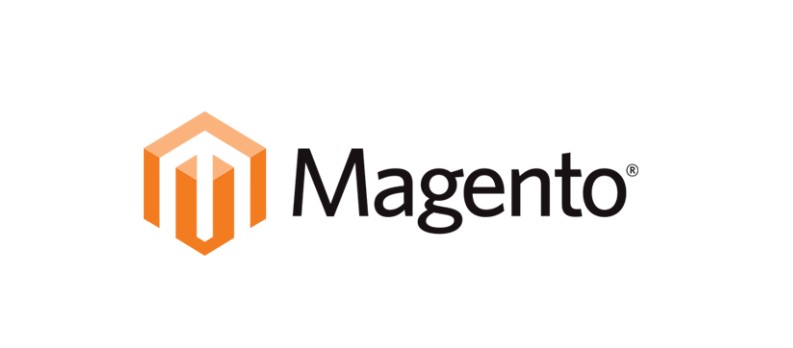
OpenCart
OpenCart is also a free, open-source eCommerce platform developed on PHP/MySQL code. The platform is widely known for its simplicity and user-friendliness.
It’s a solution for you if you don’t have much technical knowledge. Managing products, promotions, orders, and reports can be easily controlled from the admin backend without much technical involvement.
According to BuiltWith information, OpenCart is used by 969,524 websites as of 2020. The platform users are small and mid-size businesses in the U.S., Russia, the U.K., Ukraine, and Brazil.
CHECK OUT Shopify vs Magento and Magento vs PrestaShop and pick the suitable one for your store!
OpenCart vs Magento 2: Similarity
There are a few similarities between Magento vs OpenCart, and before clearing the differences between the two, we should first list what both eCommerce platforms have in common:
- The platforms are both open-source, and they are developed in PHP
- Allows the ease of adding products without much technical knowledge by using the templated approach.
- Offer a market of various add-ons.
- Supports multiple languages and currencies.
- Allows your customers to make recurring payments.
Now that we have looked through the similarities between Magento and OpenCart, we can see how each platform distinguished itself from the other in all aspects.
Magento vs OpenCart: Differences
For your quick information, we have thrown together an infographic below that compares Magento 2 vs OpenCart in various aspects before elaborating in detail on each section.

In addition, Magento contains robust functionalities for both B2B and B2C businesses. The Commerce edition with built-in B2B modules supports store owners to adopt requirements for a better B2B shopping experience. In case you plan to use the open-source edition, don’t worry because Magento extension providers develop a lot of Magento B2B modules to support wholesale business demands.
Meanwhile, Open Cart is limited for B2B functionality and users need to acquire add-ons to enhance the business.
Preparing for a new B2B website? Let our B2B web development simplify it for you!
Administrator’s User Interface
One of the first distinguishing characteristics of the two eCommerce platforms is the administrators’ user interface. No matter where you are in experiences with eCommerce platforms, either professionals or novices, you would want to seek a user-friendly interface to make the configuration contents and product process easier.
OpenCart
This aspect is where the simplicity of OpenCart appeals to beginners. Its interface is easy to navigate. You can change the design and edit products in the backend without much effort once you have familiarized yourself with the left side panel’s different tabs.

The dashboard of OpenCart also shows simplistic statistical data, which helps new merchants get information about how their business is doing.
Summary of key features:
- Easy to navigate side panel
- Present simplified statistical data
Magento
When putting Magento side-by-side with any other fellows, you would know right away that Magento is no walk in the park. The platform is packed with features and abilities, but there is a steep learning curve to master it.
Store owners who have a Magento website are often looking for developers to develop and maintain their store’s UX, and UI rather than dealing with it themselves.
That being said, the Magento interface panel is also easy to navigate around, and you can see more statistics related to your store in a separate advance report depending on each store view.
Magento also provides merchants with official guiding documents for merchants and the Magento forum can also support them with any issues they have in store management.

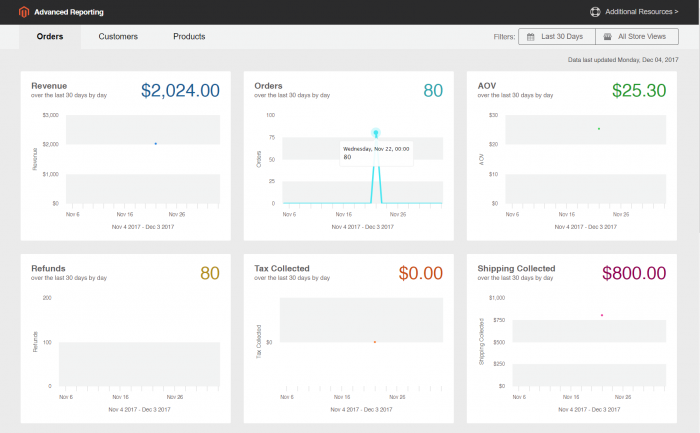
Summary of key features
- The Magento sidebar is easy to navigate
- Technical knowledge required to a certain degree
- Comes with official documentation for help and support.
SEO & Marketing Tools
SEO and Marketing tools at your fingertips are another feature you might seek out in an eCommerce platform, and use as criteria in the comparison of Magento vs OpenCart.
When it comes to equipping yourself with SEO weapons to boost your competition on Google ranking, many users are not satisfied with OpenCart due to the limitations in its SEO features. The eCommerce platform does allow some basic adjustments like changing the meta tag and adding 301 referrals or rel= canonical, but you will need PHP programming skills to accomplish the tasks. If you’re new, this process might become too complicated to handle.
Magento, on the other hand, opens endless possibilities for SEO. It will help you achieve higher ranks on SERPs as they give users multiple functionalities and extensions to customize their shop’s design & SEO attributes.
Magento allows owners to set ideal meta-titles, and keywords, provide descriptions for their products, and set CMS pages’ keywords and categories. Magento also supports rich snippet and XML site map setups.
In addition to the SEO functions, Magento also has marketing integration with Google Analytics, Google Privacy Setting, Google Content Experiments, Google Tag Manager, and Google Adwords. These powerful tools allow merchants to optimize content, analyze traffic, and make your shop appear in the competition.
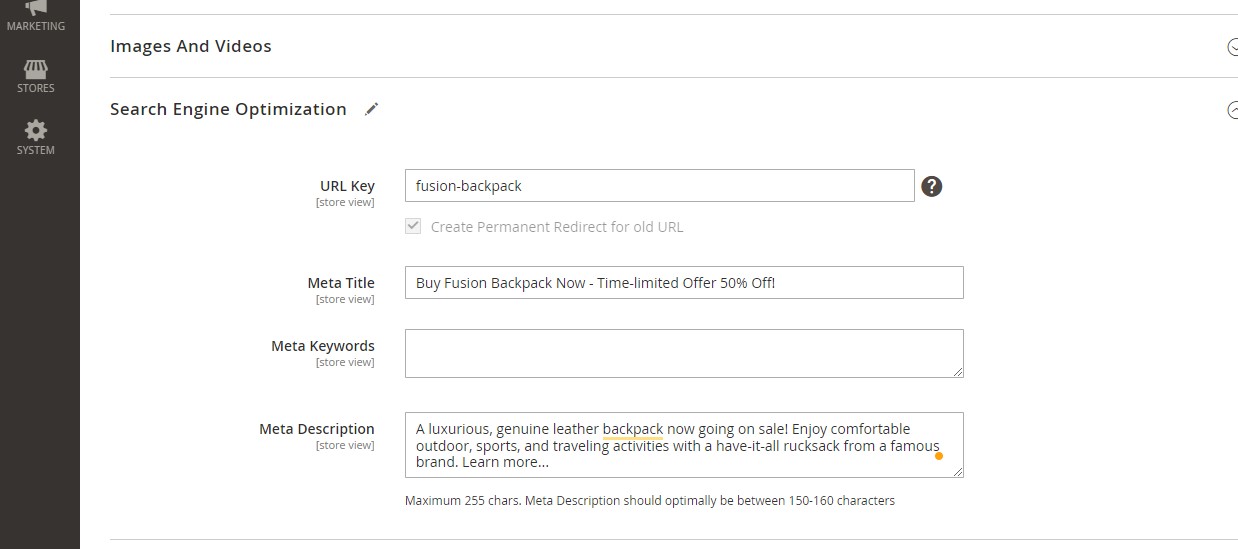
The Verdict: When it comes to Magento vs OpenCart SEO and marketing aspects, then Magento easily outshines its competitor. OpenCart does allow some SEO features, but if you want high-end SEO-friendly marketing solutions without fumbling with complicated codes, then hands down to Magento.
Performance
OpenCart
As a study conducted by Quanta pointed out, OpenCart’s response is a little behind compared with other eCommerce platforms. It took an average of 831 milliseconds to load, and the category page was even taking a longer time at 910 milliseconds – about 1.6 times Google’s recommendation for SEO.
The slow loading time could have negatively impacted the user’s experience, with two-thirds of UK customers thinking the slow-loading website was the reason for their abandoned cart.

Source: Quanta
If OpenCart wants to get more customers and appeal to store owners, this is the part where it needs to improve.
Magento
On the other hand, Magento scored their platform’s loading page at an average of 665 milliseconds, which exceeded the “under 500 milliseconds” Google’s standard.

Source: Quanta
The Verdict: Overall, Magento wins this round over OpenCart, with a much faster loading page time.
Apps & Add-ons
OpenCart
The OpenCart marketplace is vast, with around 13,000 extensions available (both free and paid). You will be able to find plugins, themes, and extra functionality modules in there.
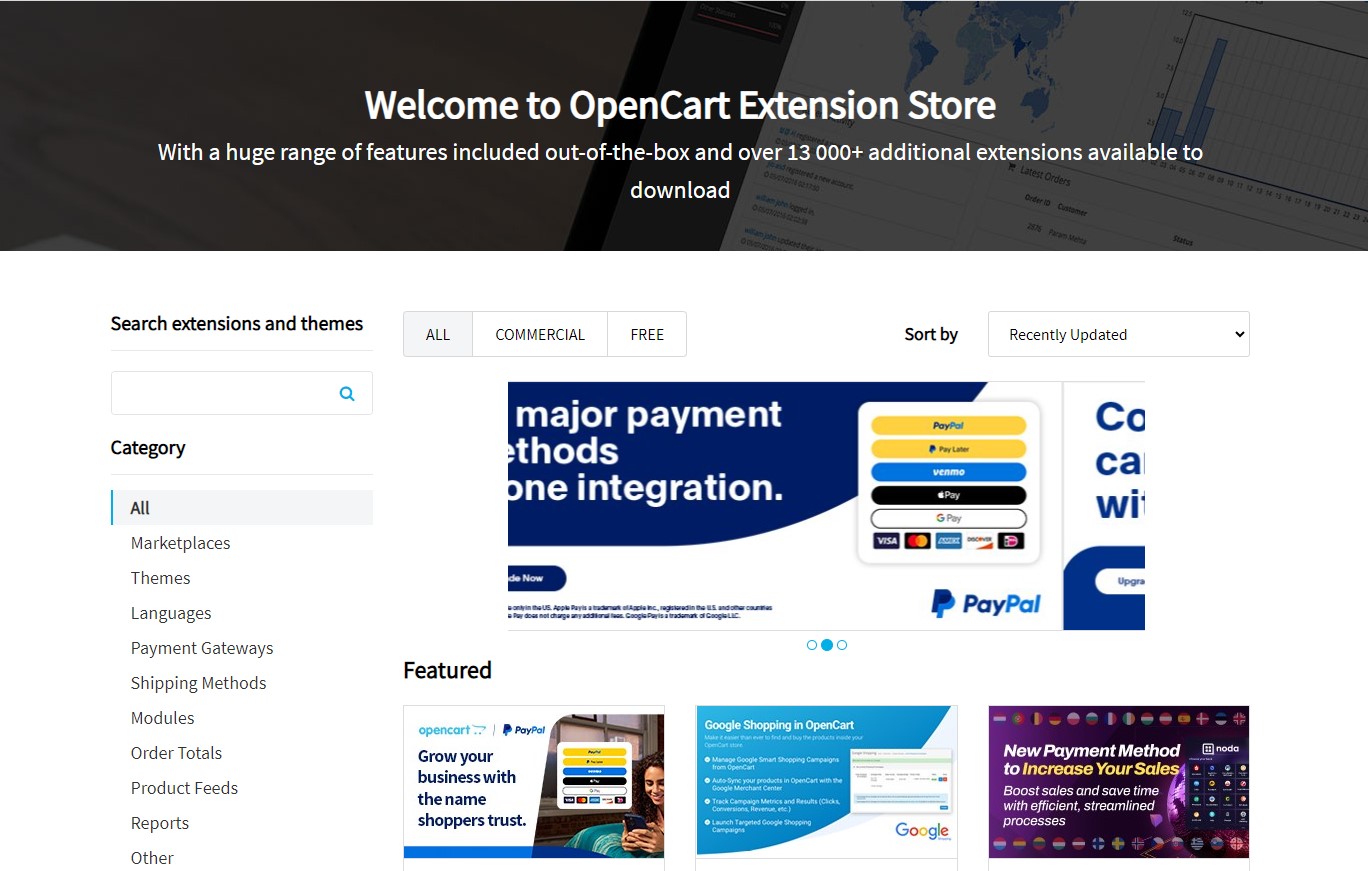
Magento
Magento marketplace has fewer extensions and modules available on its marketplace. Those are designed to go smoothly with the Magento backend, which empowers merchants with more features without dabbling much in code.
Currently, the Magento marketplace has 5,000+ extensions that are carefully checked for plagiarism, coding standards, compatibility, and security.
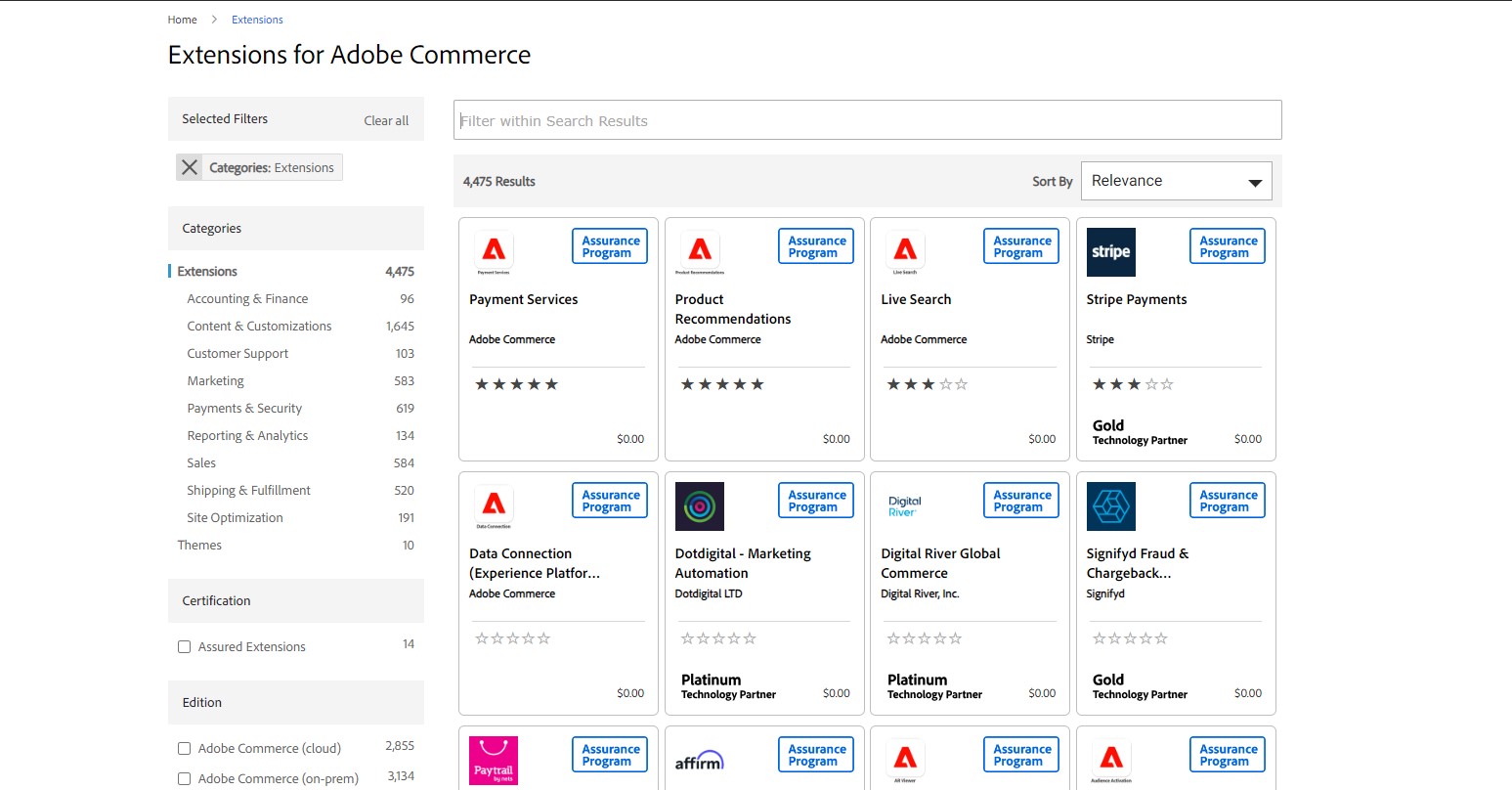
The Verdict: The OpenCart marketplace is larger than Magento with more apps, and benefits merchants in customizing their store’s functionality. Magento offers fewer extensions, however, they are closely monitored and look out for any security or integrity issues.
EXPLORE NOW this extensive Magento Hyva compatible modules library and OPEN limitless customization!
Themes
OpenCart
In terms of themes, OpenCart supports 500+ themes free & paid (which cost around 60$ – 70$), while Magento themes have 11 on the Magento marketplace and over 600 themes on Themeforest.
OpenCart lets you see how the themes would look on your store before deciding on which one you want to pay for. You can also edit the theme later using OpenCart’s Theme Editor.
Magento
On the Magento side, it comes with a default theme Luma, and a blank theme that you can use to customize your own theme from scratch.
Similar to OpenCart, Magento themes do allow demos for users to check out how the theme looks with their store before deciding on buying them. And with the feature giving you the ability to design Magento 2 themes from the beginning, there’s no measure of how much you can personalize and add touches to your store.

The Verdict: In the theme comparison, Magento 2 vs OpenCart is tough to choose. Both have multiple themes available on the marketplace, and they allow editing/creating a customized theme of your own.
Ease of use
OpenCart
In the ease of use, the Magento vs OpenCart battle has shown the latter to be easier for beginners in the installation and setup process. However, you still need some technical knowledge of hosting, FTPs, security updates, etc.

Magento
On the other hand, Magento is robust and offers a lot of features, which means the merchant will have more control over some elements of the store. They both empower users but also make the program heavier, and the process of installation and configuration is much more complicated.
On each tab in Magento’s admin panel, there are a staggering number of setting options that are actually more time-consuming to Google all the configuration steps than the configuring process itself.
Doing any customization, maintenance, or installing extensions for the site would require an understanding of technology, quick-to-pick-up knowledge, and some wiz about the platform.
Luckily, if you still want to get the most out of Magento and are not that tech-familiar, you don’t have to do it alone. There are Magento service providers dedicated to working with the platform. They will support you with all the needs from building your Magento website, to maintaining, updating, and migrating to import and export your product data to the store.

GET READY to efficiently revolutionize your Magento store with our Magento 2 development services!
The Verdict: OpenCart is the easier one to install and set up out-of-the-box. It’s designed to be friendly with new businesses, and you would be ready to get the business going after a few hours of setting up.
Magento, on the contrary, is the perfect platform for medium and large retailers. It is challenging for merchants with none to little tech experience, and the installation process would be time-consuming and require research about the platform beforehand.
But if you are confident with your technical expertise, or have an experienced Magento developer team working with you, then go for it, because the platform is ideal for you. Magento is strong for its capability of fully customizable functions, and designs, and there are tons of plugins for you to expand your store’s abilities.
Pricing & Costs
For the Open Source version of Magento, you will not have to pay a fee for the platform itself, but you still need to take hosting costs, themes’ price, and development expenses into account.
OpenCart is completely free but similar to Magento, you still have to pay for hosting, theme, and website development. If you want to add premium features or dedicated support from OpenCart, you have to spend some extra money on that as well.
| Magento | OpenCart |
| $100-1000 per month for hosting | $12 – $50 per month for hosting |
| Theme range from $30 – $500
Additional costing:
|
Extensions & themes from $20-$150
Additional costing:
|
Magento and OpenCart both have the paid versions, with Magento Commerce starting from $22,000/annually, and Magento Commerce Cloud which costs $40,000 / year. OpenCart also provides paid Cloud versions with three payment options. All of the two platforms’ free & paid are shown below:

If you want to read more features beyond what the open-source version could offer, or thinking of a paid plan with other eCommerce platforms, then Shopify Plus is also a good candidate for you to consider.
Check out Magento 2 Commerce vs Shopify Plus before bumping your store up with these paid options!
Community Support
With an Open-Source eCommerce platform, you might be more concerned about the developer community than the customer service from either Magento or the free version of OpenCart, as it’s often border to nonexistent.
But, over time, the Magento community has grown to 450,000 members, and developers who want to share their technical knowledge. If you’re a tech-savvy person and are able to selectively choose the answers you need, then a large community will be a huge benefit for you.

Apart from the community, Magento also provides a step-by-step guide for merchants that explains in detail all the installation, configuration of themes and modules, etc.
OpenCart, similar to Magento, also has a Community Forum for people to share their knowledge and experiences in operating online businesses, with a total of over 120,000 community users. The second way of getting the support you need is to purchase the dedicated support service starting from $99/site/month.
The Verdict: Magento and OpenCart are both open-source platforms, therefore you better seek the answer from the Community Forum and other service provider’s consultation than depend on the platform’s support. OpenCart does give you dedicated support, however, the cost for it is expensive.
Security
Magento
Magento takes security very seriously and they often monitor their system for any risks. They release patches often and along with the updates, so you can always ensure that your website is protected by updating the version and security patch often to keep your store from hackers and fraud attacks.
Also, following Magento’s security guidelines from ServerGuy would give you helpful materials for Magento 2 protection.
Another Magento’s interesting feature is the Content Security Policies (CSP), which is also accessible for open-source Magento. These are powerful tools that help mitigate the risk of Cross-Site Scripting (XSS) and related attacks, like card skimmers, session hijacking, clickjacking, and more.
Additionally, you can choose comprehensive Magento support and maintenance services from Magento agencies. They have an expert team to address any issues you may encounter and ensure your eCommerce website runs smoothly.
OpenCart
OpenCart isn’t responsible for securing your website, so it is up to you to secure your own server. The fact that it’s an open-source platform, which means the code is publicly available for everyone, and the platform has fewer patches and upgrades makes it further vulnerable to attacks from hackers.
OpenCart third-party add-ons contain security holes as well, and they are not as regulated and screened as Magento is. So if you’re going with OpenCart, be cautious about using third-party extensions, and don’t use the ones from dubious origins.
The Verdict: If you’re looking for a platform that’s robust, always up-to-date, and security guaranteed, Magento is more suitable for you than OpenCart.
Payment Method
When it comes to the battle of payment methods, Magento 2 vs OpenCart shows that OpenCart surpasses its competitor in quantity.
OpenCart
36 payment methods can be integrated with OpenCart, which includes 2Checkout, SagePay, Paypal, WorldPay, and more. Other payment methods can be downloaded from the OpenCart Extension Store.
Magento
Magento by default only has PayPal, and Braintree as payment methods. Merchants can then add more to their preferences via Magento Marketplace. On top of that, you can try out features such as one-click payments, guest checkouts, etc.
The Verdict: OpenCart provides more payment gateways, which is a competitive advantage over Magento by default. For both platforms, users have ways to add more payment methods to their liking and try out certain payment features that would benefit the store.
More comparison: Magento vs Woocommerce – Which one was developed for you?
More importantly, for merchants, you can’t miss the comparison chart of Magento vs Shopify vs BigCommerce – three giants in the eCommerce world.
Final words
We have listed highlighted features from two popular eCommerce platforms, Magento vs OpenCart, and will leave you to review, consider, and give your final decision to shop for the platform that is suitable for your business.
To sum up all the comparisons, Magento is more complex and requires a higher level of technical proficiency, but it’s a powerful, more secure platform that allows merchants to customize how their site looks and its functions more extensively than OpenCart. If you’re a growing fast business with a bigger budget, then Magento is for you.
On the other hand, OpenCart thrives on being beginner-friendly and cost-effective, which is a suitable choice for small startups and medium-sized businesses.
BSS Commerce is one of the leading web development service providers in the world. With 8+ years of experience, certified Magento developers, and specialists, we guarantee high quality and commitment to satisfying your business requests.
We covered a wide range of Magento services such as website development, maintenance, speed-up consulting packages, etc. We also provide a library of 178 free & paid Magento plugins and offer FREE Installation – FREE 1-year Support, and FREE Lifetime Update for every Magento extension.
CONTACT NOW to explore our services and boost your business to the next height!
